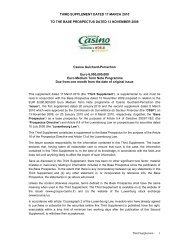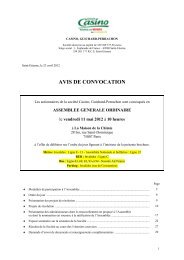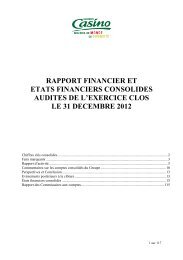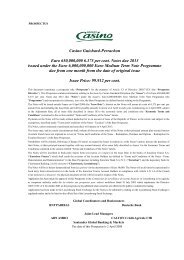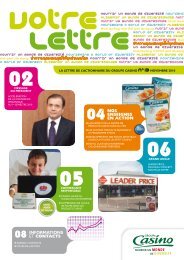2010 REGISTRATION DOCUMENT (3.4 Mo) - Groupe Casino
2010 REGISTRATION DOCUMENT (3.4 Mo) - Groupe Casino
2010 REGISTRATION DOCUMENT (3.4 Mo) - Groupe Casino
You also want an ePaper? Increase the reach of your titles
YUMPU automatically turns print PDFs into web optimized ePapers that Google loves.
CORPORATE GOVERNANCEAppendix: Board of Directors’ Charter5organisation, the report also indicates any provisions that are not appliedand the reasons why. It indicates where a copy of the code may be obtained.If the Company does not voluntarily refer to such a corporate governancecode, the report describes the Company’s corporate governance practicesover and above the legal requirements and explains why a reference codeis not used. The report also describes any special conditions regardingshareholder attendance at general meetings or refers to the provisions ofthe articles of association where such conditions can be found. The reportsets out the principles and rules set by the Board of Directors to determinethe compensation and benefits paid to executive officers and refers todisclosure of the information required by article L. 225-100-3 of the FrenchCommercial Code (Code de commerce).The report is approved by the Boardof Directors and published.The Chairman is elected for a period not exceeding his term of office asdirector. If the Chairman reaches the age of 70 while in office, he is requiredto stand down at the end of that term.In the event of the Chairman’s temporary unavailability or death, the Boardof Directors may appoint another director as acting Chairman. In the caseof temporary unavailability, the acting Chairman is appointed for a fixedperiod, which may be renewed. In the case of death, the acting Chairmanis appointed until such time as a new Chairman is elected.Article 8 - Senior ManagementBy virtue of article L. 225-56 of the French Commercial Code (Codede commerce), the Chief Executive Officer has full powers to act in allcircumstances in the name of the Company within the limits of its corporatepurpose, and except for those powers vested by law in the Board of Directorsor in the shareholders in a General Meeting. The Chief Executive Officerrepresents the Company in its dealings with third parties.However, the Board of Directors has decided, as an internal rule, that theChief Executive Officer must obtain the Board’s prior authorisation for thefollowing:■■transactions that are likely to affect the strategy of the Company and itssubsidiaries, their financial position or scope of business, such as thesignature or termination of industrial and commercial agreements likelyto materially influence the Group’s future development;transactions representing over two hundred million Euros (€200,000,000),including but not limited to:- investments in securities and immediate or deferred investments in anycompany or business venture,- sales of assets, rights or securities, in exchange for securities or acombination of securities and cash,- acquisitions of real property or real property rights,- purchases or sales of receivables, acquisitions or divestments of goodwillor other intangible assets,- issues of securities by directly or indirectly controlled companies,- granting or obtaining loans, borrowings, credit facilities or short-termadvances,- agreements to settle legal disputes,- disposals of real property or real property rights,- full or partial divestments of equity interests,- granting security interests.This €200 million ceiling does not, however, apply to finance lease transactionsrelating to buildings and/or equipment, for which the maximum aggregateauthorised amount is set at €300 million per year.These provisions apply to transactions carried out directly by the Companyand by all entities controlled directly or indirectly by the Company, exceptfor intragroup transactions.The Board of Directors may grant the Chief Executive Officer authority tocarry out the following transactions, up to a maximum aggregate limit seton an annual basis:■■■Guarantees and security interestsThe Chief Executive Officer may issue guarantees or other security intereststo third parties in the Company’s name, subject to a maximum annual limitof €600 million and a maximum limit per commitment of €300 million.Loans, confirmed credit lines, short-term credit facilities and all financingagreementsThe Chief Executive Officer may negotiate and/or renew or extend loans,confirmed credit lines, short-term credit facilities and all syndicated andnon-syndicated financing agreements subject to a maximum annual limitof €3 billion and a maximum limit per transaction of €500 million.Issuance of bonds and other debt securitiesThe Chief Executive Officer may issue bonds or any debt securities otherthan commercial paper, under the EMTN programme or otherwise, subjectto a ceiling of €3 billion, determine the terms and conditions of any suchissue and carry out all related market transactions. The Chief ExecutiveOfficer may issue commercial paper subject to a ceiling of €1 billion.The Chief Executive Officer may delegate all or some of these powers,except the power to issue bonds or other debt securities. He is requiredto report regularly to the Board of Directors on their utilisation.These provisions apply to transactions carried out directly by the Companyand by all entities controlled directly or indirectly by the Company.The Chief Executive Officer’s term of office is set by the Board of Directorsat its discretion, but may not exceed three years. If the Chief ExecutiveOfficer reaches the age of 70 while in office, he is required to stand downat the end of that term.In the event of the temporary unavailability of the Chief Executive Officer, theBoard of Directors shall appoint an acting Chief Executive Officer until suchtime as the Chief Executive Officer is able to resume his duties.At the proposal of the Chief Executive Officer, the Board of Directors mayappoint up to five individuals as Chief Operating Officers to assist the ChiefExecutive Officer in his duties.In agreement with the Chief Executive Officer, the Board of Directorsdetermines the scope and duration of the powers to be vested in the ChiefOperating Officers. However, they have the same powers as the ChiefExecutive Officer in dealings with third parties.The Chairman, if he is also Chief Executive Officer, the Chief Executive Officerand each of the Chief Operating Officers may delegate their powers to carryout one or several specific transactions or categories of transaction.3. COMMITTEESArticle 9 - Committees of the Board –General provisionsUnder Article 19-III of the Company’s by-laws, the Board of Directorsmay establish one or more specialised committees, appoint the membersthereof, and specify their role and responsibilities, under its oversight andauthority. The Board of Directors may not delegate to these Committeesany powers that are specifically vested in the Board of Directors either bylaw or under the Company’s by-laws. Each committee reports on its workat the next Board meeting.The Committees comprise at least three members, who must be directors,permanent representatives of corporate directors or non-voting directors,appointed by the Board. Members are appointed on a purely personal basisand may not be represented by proxy.Their term of office is set by the Board of Directors and may be renewed.The Board of Directors appoints a Chairman of each Committee, for a periodthat may not exceed that person’s term of office as a Committee member.Each Committee decides how often it will meet and may invite anyone itdeems appropriate to attend meetings.Minutes are prepared after each Committee meeting, unless specificallyprovided otherwise, under the authority of the Committee Chairman. Suchminutes are sent to all Committee members.Registration Document <strong>2010</strong> | <strong>Casino</strong> Group195



